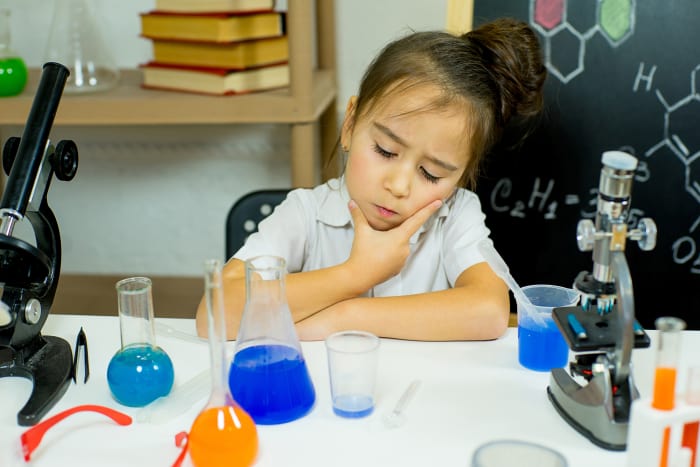How to teach your child about chemistry
Involving kids in science at home
Children often have problems studying chemistry at school, right from the beginning. At best, children simply do what they are told, but without showing any interest in the process. The problem arises because often the child simply does not understand the point of it all. This article suggests a simple way to inspire children to take an interest in this science from an early age.
Learning about chemistry
To ensure that your child has no problems studying chemistry at school, it’s best to teach them about this interesting science right now, not when they are already at school. We recommend the following:
- lessons in specialized groups;
- watching programs which provide detailed explanations of how certain substances form. They are interesting because children themselves participate in making the substances. Taking the audience into account, simple but effective experiments are chosen (sparks fly, substances change color and go bang);
- teach the child about science at home. At first glance, it seems difficult to make a home experiment center.

You don’t need to be a chemistry teacher – all you need is enthusiasm and the ability to organize the process correctly. Children will find it more interesting to do everything themselves with their parents than to simply watch the process taking place on television.
An interesting home experiment
You can show an interesting experiment at home. Click here to find interesting ideas of experiments that will amaze your child. Every parent can prepare a saline solution with vinegar in the home, and the resulting effect will amaze children and show them how knowledge of chemistry is used in everyday life.

You can also show the importance of chemistry by discussing great discoveries made by famous chemists. You should emphasize discoveries that mean something to children: -medicine that may be required for treating colds;
- the invention of rubber and plastic which is used for children’s toys;
- felt-tip pins that change color. There are many pens which can change color under the effect of special substances. This effect also takes place as a result of chemical processes.
What you will need
To ensure that parents’ assistance has the necessary result, you should prepare beforehand for lessons with the child:
- study the content of the experiment yourself;
- be ready for questions about what happens and why – you should know the answers to common questions;
- find out how things work beforehand.
Requisites and agents
You will also need to prepare items that will be required during the process. As we only plan to make elementary products of reactions to start with, the following will be sufficient: -gloves, respirator; -soda, vinegar, cooking salt; -chemical vessel; -indicator paper (it’s best to buy different kinds); -paper cone; -copper sulfate; -alkalis, acids (these are not always available in ordinary shops, and so if you cannot find professional requisites, then choose experiments that use acetic or lemon acid – they are usually easy to find).
You should also organize the work place. The kitchen table is suitable. The main thing is to make sure that there is nothing nearby which could interfere in the experiment
Beginners’ experiments
To begin with, choose a list of simple experiments. They will be sufficient to make an impression. It is very important to ask the child for help at this time (add the right agent, supply items, watch what is happening). The child will probably ask why something happens the way it does – it’s best to prepare a simple and understandable answer beforehand. You shouldn’t overwhelm the child with complicated explanations and terms.

During the experiment, explain to the child what you needed, what you had to add, and what the resulting product should be. If a substance turns into gas or catches fire, then you don’t need to warn the child about this – it will be a surprise, and be even more impressive. We’ll look at some simple examples of how to surprise a child in the home.
Example 1
Put 1 spoonful of soda into a glass, and gradually add 2 spoonfuls of vinegar. The reaction between them causes gas to form – the mixture starts to hiss. If you take a narrow glass and put a paper cone on it, you can get an interesting effect. If you pour the vinegar quickly, the substance will transform quickly (move to a gaseous state), and the paper cone will simply fly into the air.
Example 2
Place a piece of iron in a chemical vessel, and pour diluted acid on it – bubbles will appear. If you place the iron in an alkaline solution, it will soon start to rust. You will have to wait for this to happen. Make sure that the iron has not been treated beforehand (protected against rust), or the experiment will not work.
Example 3
Pour alkali into one beaker, and acid into another. Lower litmus papers into the beakers. The paper in the alkali will turn blue, and the one in the acid will turn red. Repeat the experience with different acids and alkalis.